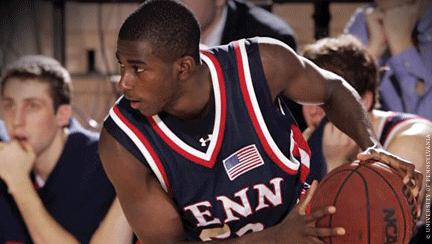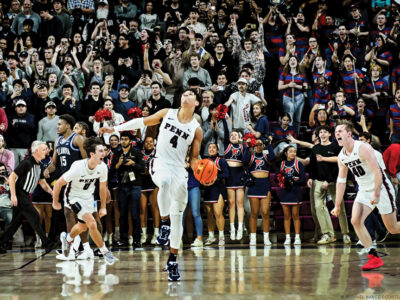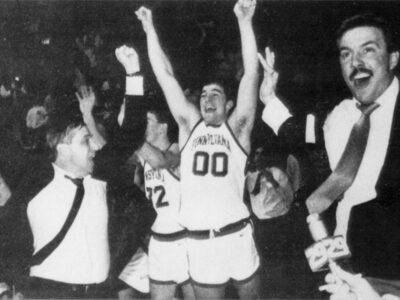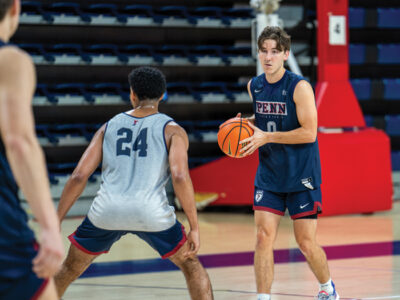
By David Porter
The scene was enough to send any Red-and-Blue-blooded follower of Penn basketball into a deep funk.
As Cornell manhandled the Quakers on the Palestra floor the first weekend of February, the defending Ivy champs’ pep band gleefully launched into the familiar and mildly explicit (not to mention loud) refrain the Penn band has employed in the past to reinforce who is on top and who is not. It was proof positive that the rest of the Ivy League is indeed singing a different tune these days, and it’s hard to begrudge them the pleasure after decades of futility.
That doesn’t make it any less galling for players like senior guard Kevin Egee, one of the final holdovers from an era that is fast fading from the memories of many Palestra denizens. Stepping into a program in the midst of a string of six 20-win seasons in seven years can spoil a guy—and make the tough times sting a little more.
“It’s definitely frustrating,” Egee said after the Quakers had fallen to 1-3 in the league by getting swept on an Ivy weekend at home for the first time since the final two games of the 1967-68 season. Ouch. “I probably take losses worse than the next guy. But I try to let them know that I’ve seen both sides: the good, the bad, and everything in between. With that experience I can offer some positive insight into what we need to do, and just try and bring energy every day.”
The slide has been precipitous, to the point that Penn has found itself stuck in that rut teams fall into when losing becomes the norm and each night brings a new variation on the same theme. In short, the Quakers have found ways to not win, whether by going scoreless for eight minutes in the first half against La Salle on January 21, or giving up a 19-4 run to end the first half against Cornell on February 7, or scoring two points in the final four minutes of a game at Dartmouth on January 31.
Coach Glen Miller took the drastic measure of sitting four starters—sophomores Tyler Bernardini and Jack Eggleston, freshman Zack Rosen, and senior Brennan Votel—to start the game against Cornell after a lackluster effort the night before in a 74-63 loss to Columbia. The bold move worked right out of the box as Penn fashioned a 15-8 lead with Egee, sophomore Harrison Gaines, sophomore Conor Turley, and junior Justin Reilly on the floor, but that was soon erased by the aforementioned late first-half spurt, and the Big Red’s overall talent advantage gradually won out.
“The roof’s not falling in,” Miller said after the game. “We don’t have any internal problems. We’re just a struggling basketball team.”
The Columbia loss exposed the Quakers’ defensive shortcomings, as did an agonizing 63-60 loss at Dartmouth the previous weekend. Against the Lions, the area around Penn’s basket became a personal showcase for Columbia’s center Jason Miller, who threw around his 6-foot-8 frame to the tune of 21 points (on 7-for-10 shooting) and 10 rebounds. Likewise, the Quakers seemed powerless to stop Dartmouth’s all-Ivy forward Alex Barnett, who scored 24 points and appeared able to fill it up whenever he put his mind to it—for instance, in the late second half when Penn looked poised to pull away. Another defensive lapse in the final seconds allowed Dan Biber to turn a running bank shot into a three-point play that gave the Big Green a 63-60 lead and forced Penn to try a desperation 3-pointer at the buzzer.
“We’ve got talent on this team. It’s about putting forth the effort in practice,” Egee said. “Especially on the defensive end. We have to buy into the team concept, and that holds true more for defense than for offense. If you miss an assignment, you expect your teammates to cover for you, and right now we don’t really have that. But it’s not a problem that can’t be fixed.”
The Dartmouth loss stung even more because it came on the heels of a thrilling 66-60 win at Harvard the night before and could have provided the Quakers with the kind of momentum they’d been seeking since the start of the season. It also spoiled a 22-point game by Bernardini, whose performances this season have occasionally alternated between inspiring and incomprehensible.
The immensely talented sophomore was leading the team in scoring through 18 games with an average of 14.3 points, but his shooting percentages—40 percent from the field, 32 percent from 3-point range—were both down from his freshman season, when he was named the Ivy league’s newcomer of the year. Then there were the team-high 48 turnovers, a surprising number for a shooting guard who handles the ball far less than point guard Rosen, and the team-high five disqualifications. Yet Bernardini is capable of great things, and can be a player who carries the Quakers if he has the right supporting cast.
Enter Rosen, who was seemingly handed the starting job along with directions to the dining commons when he stepped onto campus after starring for nationally ranked St. Benedict’s (New Jersey). After a shaky beginning of the season, he grew into his role; through the Cornell game he had more than twice as many assists (94) as turnovers (44) and was the team’s best free-throw shooter, though his shooting from the field (31 percent from 2-point-range, 26 percent from behind the arc) needed improvement. His 15 points and nine assists against Harvard in his first Ivy League game stamped him as one of the league’s potential future stars.
How that future will play out for Penn for the rest of this season and beyond is the burning question, and the answer may not be as dire as some have feared. With a starting lineup that includes freshmen Rosen and 6-foot-6 guard Rob Belcore, who broke into the starting lineup at the end of December and has been the team’s best 3-point shooter, and sophomores Bernardini and second-leading scorer Eggleston, there is the core of a team that can return the Quakers to prominence—but the turnaround has to begin now.
“We’re pretty much at a crossroads,” Egee said. “We can go one of two ways; it can get a lot worse than it is, or we can respond. Some people on the outside are saying we’re out of the race and the rest of the season is a waste of time, but we can make something positive happen.”
David Porter C’82 writes for the Associated Press.




